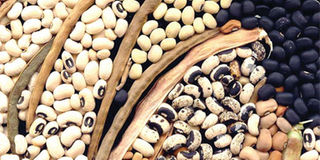Scientists learn from Nigeria’s BT cow peas

Cow peas are a commonly used legume in Africa. NET FOTO
Cow peas have emerged as one of the most economically important African grain legume and a major item in the regional trade especially within West and Central Africa. This trend has urged crop science researchers in the region to engage in research about the genetically modified cow pea species which is at field trial stage in Nigeria.
Crop scientists in Nigeria have embarked on research to biologically enhance cow pea using the Biotechnology (BT) method. Biotechnology is the manipulation of living organisms for purposes of developing another product. This is all in a bid to improve its quality and eradicate pests and diseases that have been destroying the traditional crop. And the cow pea pod borer called Maruca testulalis is a key problem affecting the crop globally.
In Uganda, researchers are conducting their trials using the conventional method at the National Semi-Arid Resource Research Institute (NaSARRI) at Serere in Soroti District. According to Mr Martin Orao, a senior breeder majoring in cow pea breeding, researchers started the process in 2007 with a major aim of testing resistance of the legume plant against a virus called cowpea aphid-borne mosaic virus which is the commonest in Uganda as well as testing its yields.
The project which is funded by Alliance for Green Revolution in Africa (AGRA) will run until June next year. Right now, the conventional method, that the researchers use is crossing the indigenous cow pea varieties with those they have acquired from Nigeria.
“We have collected some varieties that are resistant to diseases, virus and pests, from the International Institute for Tropical Agriculture based in Nigeria which we cross to those varieties we have here. We mostly use the flowers for crossing exercise,” Mr Orao said.
He explains that before the crossing exercise, they are planted in the green house and after germinating and shading flowers, the crossing exercise begins. To carry out this exercise, the researchers remove the petals to establish both the male and female parts of the plant in the evening and culture them in the mornings hours when the stigma is active.
“We use the male pollen and brass it to the female part and if the end result aborts it means there could be contamination in the stigma. But if we see the pod maturing within a few days, it means the exercise is successful,” Mr Orao said.
His team has so far selected nine varieties from the exercise with three colours including black, brown and white. They will continue planting and selecting the best variety after going through the same exercise for about four times. Once they obtain a table variety free from virus, the team will then take them to farmers fields for further testing. If the result from that is good, the product will be submitted to the National Relief Committee, Ministry of Agriculture for approval.
Thereafter, researchers will be free to release it to farmers and seed companies for further multiplication. The team is working closely with farmers from the districts of Soroti, Kumi, Apach as well as other research institutes such as the National Crop Resources Research Institute in Namulonge
The Biotechnology cow pea in Nigeria is an initiative of the African Agricultural Technology Foundation (AATF), which aims at promoting both classical plant breeding and novel GM approaches to increase incomes and food security for the rural poor in sub-Saharan Africa.
The project manager of Cow pea and rice Research in Nigeria, Dr Nompumelelo Obokoh, says cow pea is a legume grown in most parts of Africa and it is used as grain for preparing dishes as well as fodder which is why attention has to be focused on it.
Dr Obokoh says the first phase of the research was completed last year in December.
The researchers have now gone into the second phase of further testing to establish if this variety is resistant to the pod borer. The research work will continue for 15 to 20 years for purposes of collecting enough data. They hope to release the variety in 2015 but on condition that the Nigerian government will have passed the biosafety law which will be used to regulate the use of the crop.
The objective of this study is to estimate the potential impacts of Biotechnolology cow pea adoption on regional cowpea trade and welfare of cow pea producers and consumers.
In contrast to much of eastern and southern Africa, there is political support for adoption of genetically modified (GM) crops in west and central Africa.
Major cowpea producing countries in Africa are Nigeria, Niger, Mali, Uganda, Mozambique, Tanzania, and to some extent, Ethiopia, Gabon, Mali and Togo. Nigeria has developed bio-safety regulations and procedures that will allow testing of GM crops.




